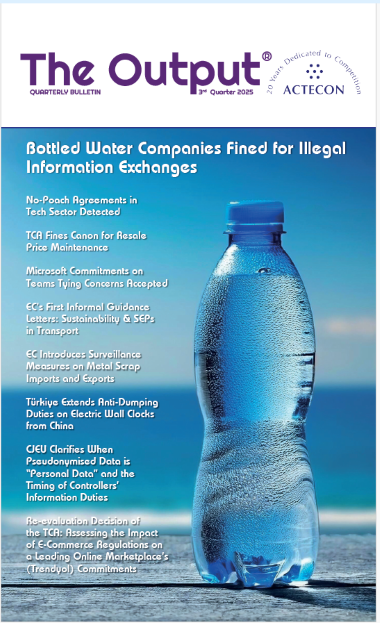State Aids – Does New Regulation Bring Precision?
| Regulation

State Aids – Does New Regulation Bring Precision?
Article by Ertuğrul Can Canbolat, Muhammed Safa Uygur and Su Başak Satır
On 31 March 2023, a Presidential decision was announced in Official Gazette with respect to the enactment of the Regulation on the Procedures and Principles Regarding the Implementation, Coordination, Monitoring and Evaluation of State Aids (“Regulation”)[1]. The relevant regulation appears to bring clarity regarding the definition of state aids and procedures for the state aid proposal as well as the preparation of the impact assessment reports. The Regulation concerns the state aids applied by the public administrations and public enterprises included in the Public Finance Management and Control Law[2].
The Regulation lists the state aids under 10 categories which have been/will be provided to a specific natural or legal person or group of natural and/or legal persons for the purpose of initiating, maintaining or developing an economic activity. In this regard, the definition of each category defined as state aid is as follows:
|
Cash |
Monetary support in the form of grants-in-aid provided in return for expenditure or activity without seeking for its repayment |
|
Capital |
Cash transfers or settlements to ensure the continuation of the activities of the enterprises which are owned by a public body or in which the public body is a partner or to maintain or increase its existing shareholding in these enterprises and monetary support made in order to become a direct or indirect partner in an undertaking, enterprise or fund |
|
Tax |
Opportunities or privileges provided to taxpayers through discount, exemption, exclusion, postponement or cancellation of tax rates determined in accordance with the relevant laws |
|
Social Security |
Supports to fully or partially cover the premiums, shares and similar obligations that employers and/or employees are required to pay to social security institutions within the scope of social security legislation |
|
Real Estate |
Privileges and concessions for the provision of rights related to real estate such as transfer of its ownership, usus or fructus which are owned by the treasury, special budget administrations, provincial special administrations or municipalities or under the control and disposal of the state |
|
Infrastructure |
Supports for the provision of facilities such as transport, communication, energy, water and sewerage or modernisation of existing facilities |
|
Aids in Kind |
Supports for the provision of raw materials, intermediate goods, fixtures and similar products or the establishment of rights to tangible or intangible assets without any cash in return |
|
Financing |
Advantages and privileges in terms of the factors (such as interest rates, dividends, maturities, guarantees) of a loan provided by credit or financial institutions, compared to market conditions |
|
Purchase |
Supports for the purchase of goods and services produced within the conditions determined by providing price advantage in the procurement of goods and services and construction works by the public, at a certain price or quantity |
|
Technical-Training |
Supports for the training or the provision of expert personnel and consultancy services and training regarding the technical development, which are non-cash and provided gratuitously |
Furthermore, the Regulation also brings a reporting obligation for each state aid to the public institutions and organisations, which are responsible for directly or indirectly implementing state aids. The aim of those reports will be to observe and monitor the impact of the state aids which are offered, in force, revoked or withdrawn.
For an offered aid, a preliminary impact assessment report shall be prepared by the implementing agency. In preliminary impact assessment reports, the expected impact of an offered state aid on the beneficiaries will be calculated on the basis of the assumptions reached through available data. In this context, the method(s) used in the calculation, the data and assumptions to be used for measurement as well as their justifications shall be explained in the reports. Additionally, an implementing agency shall submit its state aid offer to the Presidency of Strategy and Budget (“Presidency”) to which draft Presidential decision, state aid offer form and preliminary impact assessment report shall be attached. It is fundamental that the draft Presidential decision contains the essential elements of state aid, such as the purpose, scope, elements, rate and/or amount of the aid, duration powers and responsibilities of the relevant implementing agency.
For the aids in force, implementation period impact assessment reports shall be prepared. In the concerned reports, the annual impact of the state aids in force will be measured by using the realisation data of the previous calendar year. While preparing the report, the results of the measurement will be evaluated through the method(s) used in the preliminary impact assessment report.
For revoked or withdrawn aids, post-implementation impact assessment reports shall be drafted. Such reports will be prepared after the completion of the implementation of the relevant state aid that was provided for a certain period. The impact of the state aid on the beneficiaries in the period between the start and end date will be measured and evaluated in total.
Apart from those, by the end of March each year, each implementing agency shall also provide the Presidency of Strategy and Budget (“Presidency”) with separate state aid monitoring reports on the implementation of the results of each state aid in force in the previous calendar year. The monitoring reports shall be accompanied by an implementation period impact assessment report for each relevant state aid in force and a post implementation impact assessment report for each revoked or withdrawn state aid. An implementing agency is also required to instantaneously upload the requested data to the State Aids Monitoring System of the Presidency.
In this context, the implementing agencies shall fulfil their duties within the scope of the Regulation by certified personnel. The Presidency provides training on impact assessment methods to implementing agencies or ensures that training is provided through organisations to be determined by the Presidency.
Lastly, by the end of June of each year, the Presidency shall draft a state aid evaluation report within the framework of yearly state aid monitoring reports and present it to the attention of the President of the Republic as well as structural impact assessment report for certain state aids.
In conclusion, the relevant regulation aims to bring certain precision and transparency with respect to the state aids, but it still seems questionable whether the result of such reports in general will be made publicly available or not.
Published by Lexology on April 3, 2023.
[1] The relevant regulation has been drafted and enacted pursuant to Article 10 of the Presidential Decree No 102 on the Implementation, Coordination, Monitoring and Evaluation of State Aids (“Decree”) which was published in the Official Gazette dated 9 June 2022. The Regulation’s articles except Addendum Article 1 (which sets forth the purpose of the Regulations and has entered into force on the date the Regulation was published in the Official Gazette) will enter into force on 1 June 2023.
Please see the following links for the Decree and the Regulation respectively:
https://www.resmigazete.gov.tr/eskiler/2022/06/20220609-1.pdf https://www.resmigazete.gov.tr/eskiler/2023/03/20230331-22.pdf
[2] The Public Finance Management and Control Law regulates the structure & process of the public finance management, preparation & implementation of the capital budgets, and recognition & reporting & controlling of all financial transactions in order to ensure the effective, economic and efficient attainment & use of public resources in line with the policies and goals of the development plans & programmes as well as the accountability and financial transparency.







